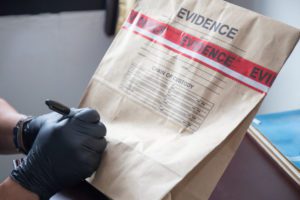 Justice Albin continued in relevant part: Certain evidence was never presented at trial. First, a six-page report prepared by Lieutenant Charles Redd of the Hudson County Prosecutor’s Office provided a narrative of the homicide investigation and Thomas’s importance to that investigation. The Redd Report revealed that investigators found in the victims’ car a pager number listed to “Rabb.” When that number was called, however, it was Thomas who responded to the page. As a result, Thomas was interviewed. Before his arrival at the Prosecutor’s Office, Thomas made an anonymous telephone call to Jersey City Police Communications and claimed that Rabb and LaCue were responsible for the killings. During the interview, he told investigators that “he did not know the victims” or LaCue and that he was with his girlfriend, Arlene Forrester, and her sister, Hazel Forrester, at the time of the shootings.
Justice Albin continued in relevant part: Certain evidence was never presented at trial. First, a six-page report prepared by Lieutenant Charles Redd of the Hudson County Prosecutor’s Office provided a narrative of the homicide investigation and Thomas’s importance to that investigation. The Redd Report revealed that investigators found in the victims’ car a pager number listed to “Rabb.” When that number was called, however, it was Thomas who responded to the page. As a result, Thomas was interviewed. Before his arrival at the Prosecutor’s Office, Thomas made an anonymous telephone call to Jersey City Police Communications and claimed that Rabb and LaCue were responsible for the killings. During the interview, he told investigators that “he did not know the victims” or LaCue and that he was with his girlfriend, Arlene Forrester, and her sister, Hazel Forrester, at the time of the shootings.
Thomas eventually conceded that he was not truthful when he denied knowing LaCue, and some of his statements about Hazel and Arlene were inconsistent. After Thomas left the interview, the police received another anonymous telephone call, stating that Hannah had confessed to killing the victims, not only to Thomas but also to the caller and Hazel Forrester. Afterwards, Hazel and Arlene were interviewed by the police, and Arlene admitted that she was the anonymous caller. Because the defense did not call Lieutenant Redd as a witness, the jury never learned that Salazar and Flores had Thomas’s pager number in their possession when they were murdered, nor did they hear that LaCue had left a message on Thomas’s pager, asking to speak with him, the day after the murders. The jury also did not hear the testimony of Thomas’s mother, Mary Jones, who had information that not only inferentially implicated her son in the murders, but also provided a motive for her son to frame Hannah.
The failure to subpoena Mary Jones as a witness will be a central issue when the trial attorney for the defense testifies at a post-conviction relief hearing. If s/he cannot demonstrate that the decision to not subpoena Jones was grounded in a reasonable trial strategy decision, one of the two required for granting post-conviction relief will be satisfied.
